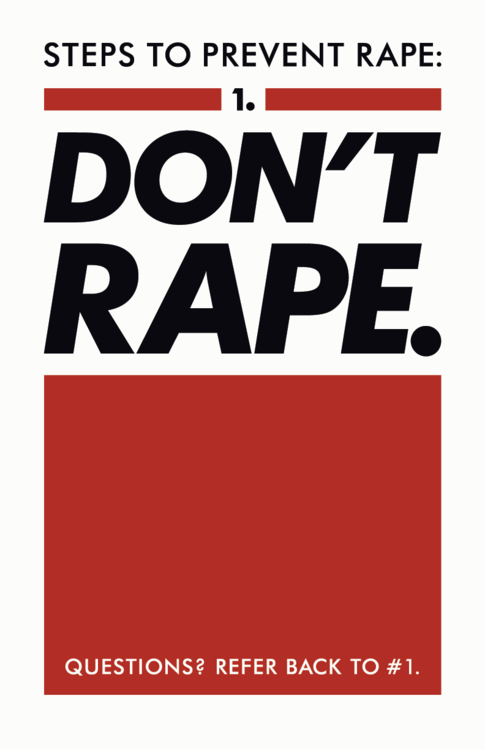
Dolce & Gabbana. It’s what all the rapists are wearing these days.
LET’S TALK ABOUT RAPE, BABY
There is this (not wholly untrue) notion in society that women never say what they mean. There are entire industries built on the male belief that if you want to know what a woman thinks, you cannot ask her. You have to decipher codes and hints, conference with your male peers and compare notes and wrangle behavioural translations from females friends if you want to know what she means. To some extent, women have done this to ourselves. And in some areas of the male/female relationship, this is more than a theory – it’s a lived reality. Even still, it is never true about sex and we should stop saying (and believing) that it is.
If the media is the voice of our society, then I submit that we are having the wrong conversation about rape. For some reason, we, as a society, have decided that rape is simply “unwanted sex”. Unfortunately, our collective image of sex and sexuality in our culture today can be summed up thus: boy always wants sex; girl sometimes wants sex. And instead of simply asking the all-important question, men think they have to decipher when a smile is a yes and when it’s a no. And so, a woman gets raped and everybody asks, “well, did she ask for it”? Obviously, in the internet age, where nothing is ever forgotten, nobody would actually say something like that (although I don’t put it past some member of the Republican Party to come very close soon). But in framing the conversation around what the victim was wearing (!), how many drinks she had (!!), how many sexual partner’s she’d had in the past (!!!!) and what part of town she allowed herself to be in alone, at night (!!!) we’re essentially doing what men apparently have had to do since Mars met Venus – figure out at what point and in what way she said yes.
(I want to take a moment to acknowledge that while women are undeniably the overwhelming majority of rape victims, there is a disturbing trend of increasing rape within the male population that is less talked about – which is a hard thing to do as rape couldn’t be talked about less- and barely acknowledged compared to male/female rape. This, too, is abhorrent and I am advocating for male as well as female victims in this article. For brevity, I will refer to victims in the female context, but that is not to forget the scope of this problem).

How about adding this to sex education instead of forcing teachers to talk about abortion? Just an idea.
Before I go further, I guess I need to explain that rape isn’t sex. Sex, by definition, implies consent. And if we talk about rape as “unwanted sex” we’re saying that at some point, she must have consented, in some kind of way, even if it wasn’t verbal. And if one time a guy gets it wrong, well, he can be forgiven, because women are soooo complicated. But rape isn’t sex. It is a gross violation of a person in the most intimate of ways. It is an assault on identity, self esteem, reproductive autonomy, physical, emotional and mental health and it reaches into all areas of her life like a tumour. It is unforgivable. It strips the perpetrator of his humanity and robs the victim of her sense of it. It is high order violence that should never be tolerated. Yet, as depicted with incredibly shameless clarity in the Steubenville rape case, our societal preference is to protect the perpetrator and shame the victim. Shame on us.
Most conversations about rape begin “Obviously, rape is awful; of course that guy did wrong, but…” and end with “what was she wearing/why was she drinking/why was she alone/there/flirting/insert (in)appropriate victim action here”? We dismissively refer to the actual crime and then soliloquise on the role the victim played in her attack (See: Serena William’s infamous victim bashing monologue). We’re talking about this the way a man would. A man who doesn’t believe it can ever happen to him. A man who sees himself as above the issue. A man uncomfortable talking about this kind of “unpleasantness”. A man for whom these are theoretical matters to be debated.
We need to be talking about this – first, we need to be talking about it, period. And when we do, we need to talk about it through the eyes of women, for whom this is as great a possibility as workplace discrimination – that is, more likely than it should be. There is a sensible and sensitive way to talk about rape. We must acknowledge that there is a place in this conversation to discuss that whether we like it or not, there are predators out there that take their cues from what we are wearing. They count how many drinks we have had. They follow us with their eyes and know if we came in alone, if we are going to need a ride home or if we are walking home alone. There is benefit to educating young women about being safe. That is an important conversation that needs to begin and then never stop.
And then we need to be telling young girls, young women, all women the truth about rape. Most victims are raped by someone they know. An Uncle, Father, Brother, Cousin, Friend, Co-worker. Men they trust. Men who are in authority over them. We need to talk about how many women are too terrified to speak up because our society will blame them for what has happened. Because, the reality is, not a whole lot of people will believe them. Because their livelihoods, their security, their safety, their futures are intertwined with that of their attacker and we haven’t yet found a safe place for desperate women to turn. We at least need to be honest that we have failed – are failing – rape victims, in our language and in our policy and in our social safety-nets.
But the larger conversation, the one that needs to be had in every little boy’s bedroom across the world is that women are worthy of the respect of men. Fathers need to teach their sons that unless he has asked the question, he will not have heard an answer and he should never assume. Men need to teach boys (and each other) that sex is not for taking. That wanting it does not mean you can have it. That hormones and the age-old “thinking with the other head” adage is not only a fallacy, it is a dangerous mis-information campaign. All men need to learn that if they violate a woman by raping her, they are choosing to be that guy.
Society needs to disown that guy. Rape needs to be an unforgivable crime, like pedophilia. It can’t be something that is overlooked when the rapist has some sporting ability or the ability to hack government servers. A rapist needs to be an outcast, not a hero. Rape needs to be black and white in our laws, in our national conversation and in our thoughts. Our current policies don’t go far enough to punish rape. They don’t go far enough even in prosecuting rapists. Our media prosecutes the victim and our conversation – “sexual assault” – paints this heinous act as a variant of the normal act of sex. For too long, men have been running our countries, our courts and our media. They have relegated violence against women to the sidelines because it doesn’t affect them. And women have been intimidated into silence. In 2013, Women – WOMEN! – are still classified as one voting block. A voting block large enough to change elections in every cycle and yet our road to the basic right to safety remains “controversial”. Women’s rights is one of the original civil rights movements and it continues. We deserve better. At the very least, we deserve a media that speaks honestly about this.
Rape is not sex, it is a crime. The rapist is the criminal and not the victim. The least we should be doing is teaching young men that those two statements are fact.
Well put. Integrating rape into sex ed talks both in the home and schools is an important point. As 2 places are the inception ground of how children and adolescents shape their perception of the world.